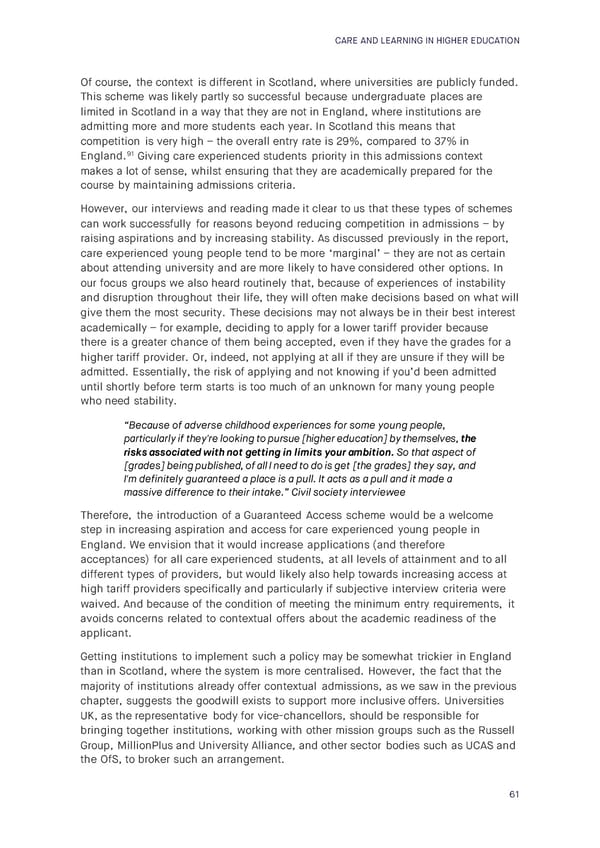CARE AND LEARNING IN HIGHER EDUCATION Of course, the context is different in Scotland, where universities are publicly funded. This scheme was likely partly so successful because undergraduate places are limited in Scotland in a way that they are not in England, where institutions are admitting more and more students each year. In Scotland this means that competition is very high – the overall entry rate is 29%, compared to 37% in England.91 Giving care experienced students priority in this admissions context makes a lot of sense, whilst ensuring that they are academically prepared for the course by maintaining admissions criteria. However, our interviews and reading made it clear to us that these types of schemes can work successfully for reasons beyond reducing competition in admissions – by raising aspirations and by increasing stability. As discussed previously in the report, care experienced young people tend to be more ‘marginal’ – they are not as certain about attending university and are more likely to have considered other options. In our focus groups we also heard routinely that, because of experiences of instability and disruption throughout their life, they will often make decisions based on what will give them the most security. These decisions may not always be in their best interest academically – for example, deciding to apply for a lower tariff provider because there is a greater chance of them being accepted, even if they have the grades for a higher tariff provider. Or, indeed, not applying at all if they are unsure if they will be admitted. Essentially, the risk of applying and not knowing if you’d been admitted until shortly before term starts is too much of an unknown for many young people who need stability. “Because of adverse childhood experiences for some young people, particularly if they're looking to pursue [higher education] by themselves, the risks associated with not getting in limits your ambition. So that aspect of [grades] being published, of all I need to do is get [the grades] they say, and I'm definitely guaranteed a place is a pull. It acts as a pull and it made a massive difference to their intake.” Civil society interviewee Therefore, the introduction of a Guaranteed Access scheme would be a welcome step in increasing aspiration and access for care experienced young people in England. We envision that it would increase applications (and therefore acceptances) for all care experienced students, at all levels of attainment and to all different types of providers, but would likely also help towards increasing access at high tariff providers specifically and particularly if subjective interview criteria were waived. And because of the condition of meeting the minimum entry requirements, it avoids concerns related to contextual offers about the academic readiness of the applicant. Getting institutions to implement such a policy may be somewhat trickier in England than in Scotland, where the system is more centralised. However, the fact that the majority of institutions already offer contextual admissions, as we saw in the previous chapter, suggests the goodwill exists to support more inclusive offers. Universities UK, as the representative body for vice-chancellors, should be responsible for bringing together institutions, working with other mission groups such as the Russell Group, MillionPlus and University Alliance, and other sector bodies such as UCAS and the OfS, to broker such an arrangement. 61
 Care and Learning in Higher Education Page 61 Page 63
Care and Learning in Higher Education Page 61 Page 63